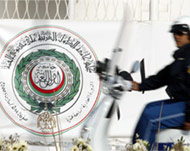Arab summit to rehash peace plan
Arab leaders meet in Algiers on Tuesday to debate how to repackage a three-year-old Arab peace offer repeatedly rejected by Israel.

As at almost every Arab summit since the first in Cairo in 1964, the Arab-Israeli conflict dominated the preparations on Monday, this time with sharp exchanges over a Jordanian proposal to re-craft the 2002 Arab initiative for Israeli consumption.
The initiative offers Israel peace and normal relations with more than 21 Arab countries in return for withdrawal to the borders as they stood on the eve of the 1967 Middle East war.
Amman, the Arab government friendliest towards Israel, had tried to simplify the two-page offer, known in the Arab world as the Beirut initiative, to send a message of peaceful intentions to Israeli and world public opinion.
Jordan’s King Abd Allah wanted to build on the slight improvement in Arab-Israeli relations since Israel‘s decision to suspend its practice of assassinating Palestinian resistance leaders, making a truce possible after four years of conflict.
Conditional halt
The main Palestinian resistance groups have offered a conditional halt to attacks on Israel until the end of this year. Egypt and Jordan, which have peace treaties with Israel, have sent ambassadors back to Tel Aviv after a four-year gap.
 |
|
Some key Arab leaders will not |
But other Arab countries, wary of appearing to dilute the conditions Israel must meet for normal relations, insisted the summit stick close to the text approved in Beirut in 2002.
King Abd Allah will now stay away from the summit, along with Lebanese President Emile Lahud, Crown Prince Abd Allah of Saudi Arabia and some other Gulf leaders, officials said.
Libyan leader Muammar al-Qadhafi, who walked out of last year’s Arab summit in Tunis after a war of words with the Saudi delegation, was the first Arab leader to arrive on Monday, after foreign ministers agreed to put on the agenda his one-state solution to the Israeli-Palestinian conflict.
Al-Qadhafi’s one state approach, which he calls Israteen, is diametrically opposed to the Arab and international consensus on a solution based on two states living in peace side by side.
Normal relations
On the 2002 initiative, the text approved by foreign ministers spells out the terms for normal relations – Israeli withdrawal, a Palestinian state with East Jerusalem as its capital and recognition of the rights of Palestinian refugees.
 |
|
Al-Qadhafi (L) calls his one-state |
Israeli Foreign Ministry spokesman Mark Regev said the offer would lead nowhere in this form. “For one side to come to the negotiations and say ‘This is the line, and from this line we will be able to talk to you’ – that is a non-starter,” he said.
“This idea that the Arabs will only talk to Israel after we solve all the problems of the Middle East is negative and self-defeating,” he added.
Jordanian Foreign Minister Hani al-Mulki, who led the campaign for a more appealing relaunch, said he had succeeded at least in breathing new life into the Beirut initiative, originally drafted by Saudi Arabia.
Arab suspicion
But the debate revealed the depth of Arab suspicion that Israel would try to take without giving in return.
Algerian Foreign Minister Abd al-Aziz Bilkhadim told a news conference: “Algeria, the country of the martyrs, will not be the venue for normalisation [with Israel].”
Arab League Secretary-General Amr Musa said Israel did not deserve any further normalisation until it changed its policies.
|
“The Jordanian initiative is like the lighthouse which promotes, sells and throws light on the Arab initiative” Ahmad Abu al-Ghait, |
Egyptian Foreign Minister Ahmad Abu al-Ghait welcomed the repackaging of the 2002 peace plan.
“The Jordanian initiative is like the lighthouse which promotes, sells and throws light on the Arab initiative,” he said in an interview with the Arabic news channel Al-Arabiya.
Syrian issue
The summit will steer clear of controversy over the Syrian military presence in Lebanon and divisions within Lebanon itself over relations with its powerful neighbour.
Bilkhadim said neither Syria nor the pro-Syrian government in Lebanon had asked the summit to address the subject.
But the Arab foreign ministers did recycle older resolutions expressing solidarity with Syria and the Lebanese government and rejecting any unilateral US sanctions against Damascus.
The foreign ministers backed an Egyptian bid for a permanent seat in a reorganised UN Security Council. Egypt is the most populous Arab state and the seat of the Arab League.
The Arab leaders will renew their commitment to domestic social and political reform but add no specific next steps, officials said.